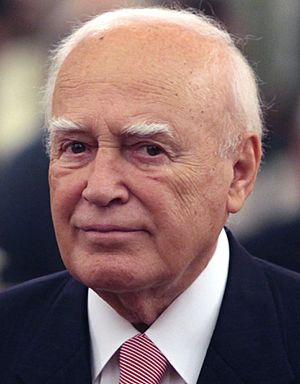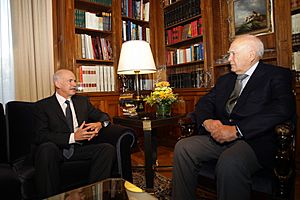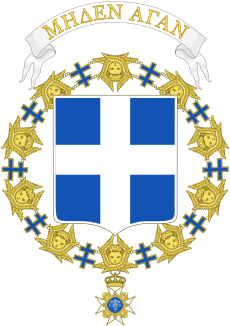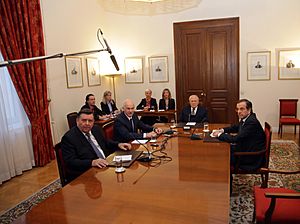Karolos Papoulias facts for kids
Quick facts for kids
Karolos Papoulias
Κάρολος Παπούλιας |
|
|---|---|

Papoulias in 2009
|
|
| President of Greece | |
| In office 12 March 2005 – 13 March 2015 |
|
| Prime Minister | Kostas Karamanlis George Papandreou Lucas Papademos Panagiotis Pikrammenos Antonis Samaras Alexis Tsipras |
| Preceded by | Konstantinos Stephanopoulos |
| Succeeded by | Prokopis Pavlopoulos |
| Minister of Foreign Affairs | |
| In office 13 October 1993 – 22 January 1996 |
|
| Prime Minister | Andreas Papandreou |
| Preceded by | Michalis Papakonstantinou |
| Succeeded by | Theodoros Pangalos |
| In office 26 July 1985 – 2 July 1989 |
|
| Prime Minister | Andreas Papandreou |
| Preceded by | Ioannis Charalambopoulos |
| Succeeded by | Tzannis Tzannetakis |
| Member of the Hellenic Parliament for Ioannina |
|
| In office 20 November 1977 – 7 March 2004 |
|
| Personal details | |
| Born | 4 June 1929 Molyvdoskepastos, Ioannina, Greece |
| Died | 26 December 2021 (aged 92) Athens, Greece |
| Resting place | Ioannina Island, Greece |
| Political party | Panhellenic Socialist Movement |
| Spouse | Mary Panou |
| Children | 3 |
| Alma mater | University of Athens University of Milan University of Cologne |
| Signature | |
Karolos Papoulias (Greek: Κάρολος Παπούλιας [ˈkarolos paˈpuʎas]; June 4, 1929 – December 26, 2021) was a Greek politician. He served as the President of Greece from 2005 to 2015.
He was a member of the Panhellenic Socialist Movement (PASOK) political party. Before becoming president, he was the Minister of Foreign Affairs for Greece. He held this role from 1985 to 1989 and again from 1993 until 1996.
Contents
Early Life and Education
Karolos Papoulias was born in the village of Molyvdoskepastos, in the Ioannina region of Greece, on June 4, 1929. His father was a Major General. When he was young, he studied in different schools in Greece.
In April 1941, when he was 11, the Nazis invaded Greece. Papoulias joined the armed resistance to fight against the Germans.
He earned a law degree from the University of Athens. He also studied international law and international relations in Italy and Germany. While in West Germany, he helped organize Greeks living abroad to oppose the military government that took over Greece in 1967. He also worked with the German radio station Deutsche Welle.
Papoulias was also a talented athlete. He was a national champion in pole vault and played for the national volleyball team. He was also involved in sports organizations.
Political Career
Papoulias was one of the first members of the Panhellenic Socialist Movement (PASOK) party. He worked closely with its leader, Andreas Papandreou. From 1974 onwards, he was regularly elected to important positions within the party.
He was first elected to the Greek Parliament in 1977, representing the Ioannina area. He kept this seat until 2004, when he was elected President.
Under Andreas Papandreou's government, Papoulias served as the Deputy Minister for Foreign Affairs from 1981 to 1985. He then became the Minister of Foreign Affairs from 1985 to 1989 and again from 1993 to 1996. He also briefly served as Deputy Minister of National Defense.
Minister of Foreign Affairs
As Minister of Foreign Affairs, Karolos Papoulias played an important role in Greece's relationships with other countries.
In the 1980s, he helped find a peaceful way for Palestinian fighters and their leader, Yasser Arafat, to leave Lebanon safely. He also worked to improve Greece's relationships with Arab countries and with Egypt. He held many discussions with Turkish Foreign Ministers to improve relations between Greece and Turkey.
He supported Turkey's goal of joining the European Union, as long as they respected international laws and European values.
Between 1993 and 1996, he helped start talks for Cyprus to join the European Union. He also worked to solve the crisis in Bosnia and Herzegovina. He signed an agreement with the Former Yugoslav Republic of Macedonia to improve relations.
Papoulias was very interested in good relations between Greece and the Balkan states. He organized the first meeting of Balkan Foreign Ministers in 1988. He also started talks about an oil pipeline project with Bulgaria and the Soviet Union. He helped restore friendly relations with Albania.
He always supported efforts for peace and disarmament. He proposed creating a nuclear-free zone in the Balkans and making the Mediterranean a sea of peace. He also helped strengthen relations between Greece and the United States.
Presidency
First Term: 2005–2010
On December 12, 2004, the leaders of Greece's two main political parties, Prime Minister Kostas Karamanlis and opposition leader George Papandreou, nominated Karolos Papoulias for president.
On February 8, 2005, he was elected by a large majority of votes in Parliament. He became the 6th President of the Third Hellenic Republic on March 12, 2005. He took over from Konstantinos Stephanopoulos.
In December 2008, there were protests in Athens after a 15-year-old protester was killed by police. President Papoulias called for calm.
At the opening of the Acropolis Museum in 2009, Papoulias asked for the Elgin Marbles to be returned to Greece from the United Kingdom. He said it was time to "heal the wounds" of the Parthenon monument.
Second Term: 2010–2015

Papoulias was re-elected for a second term on February 3, 2010, with strong support from Parliament. His second term happened during a difficult time for Greece, as the country faced a major financial crisis. This led to many protests and changes in government.
In May 2010, after Greece agreed to a financial support plan, Papoulias said that "our country has reached the limit of disaster." This was after a general strike where three bank workers died in a fire.
In October 2011, during a national parade, protesters shouted slogans against Papoulias. He had to leave the area. On that day, Papoulias emotionally shared that he had become a "guerrilla when I was fifteen years old to fight against Nazism."
In November 2011, Prime Minister George Papandreou resigned. Papoulias then appointed Lucas Papademos as a temporary Prime Minister. Later, in April 2012, Papademos resigned, and Papoulias called for new elections.
In February 2012, Papoulias decided to give up his salary as president. Later, it was clarified that his salary was reduced, not fully withdrawn.
That same month, when a German minister suggested Greece should delay its elections, Papoulias strongly disagreed. He said, "Who is Mr. Schäuble to insult Greece? We have always defended not only the freedom of our country, but the freedom of Europe."
After the May 2012 elections, no party won enough votes to form a government. Papoulias tried to bring party leaders together to form a national unity government, but the talks failed. He then appointed a temporary government and set a new election date for June. During this time, banks in Greece saw many people withdrawing money. Papoulias said there was "fear that could develop into panic."
After the June elections, Antonis Samaras became the new Prime Minister, and Papoulias officially appointed him.
In September 2013, a musician was murdered by a member of a far-right group called Golden Dawn. Papoulias stated that it was his duty to "defend democracy and the Greek people from the storm that is approaching" and protect them from neo-fascism. In 2014, during a visit from the German President, Papoulias asked for talks about war reparations for the brutal German occupation during World War II.
His term as president ended in March 2015. Prokopis Pavlopoulos was elected as the new president.
Personal Life and Death
Karolos Papoulias was married to Mary Panou, and they had three daughters. Besides his native Greek, he could also speak English, French, German, and Italian.
He passed away on December 26, 2021, in Athens, at the age of 92. The Greek government declared three days of national mourning. His state funeral was held on December 29, and he was buried on the island in Lake Ioannina.
Honours

- Grand Cross of the Order of Prince Henry (Portugal, 1983)
- Second Class of the Order of Polonia Restituta (Poland, 1995)
- Jubilee Medal "60 Years of Victory in the Great Patriotic War 1941–1945" (Russia, 2005)
- Grand Star of the Decoration of Honour for Services to the Republic of Austria (Austria, 2007)
- Knight Grand Cross of the Grand Order of King Tomislav (Croatia, 2007)
- Knight of the Order of the Elephant (Denmark, 2006)
- Knight Grand Cross with Grand Cordon of the Order of Merit of the Italian Republic (Italy, 2006)
- Knight of the Order of the Seraphim (Sweden, 2008)
- Knight of the Order of the White Eagle (Poland, 2013)
- Order of the Republic of Serbia (Serbia, 2013)
See also
 In Spanish: Károlos Papulias para niños
In Spanish: Károlos Papulias para niños
 | Shirley Ann Jackson |
 | Garett Morgan |
 | J. Ernest Wilkins Jr. |
 | Elijah McCoy |


